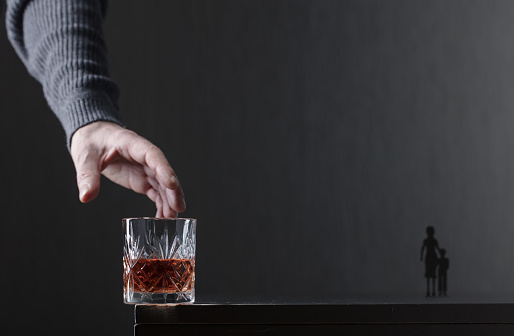Is an alcoholic driving you crazy?
How to help an addict without losing your sanity

If you live with someone who is harmfully involved with alcohol or drugs, you may question your sanity. You’re not crazy. You may feel like it, but you are not crazy.
Look at some of the rules of your household. Rules that are set by the alcoholic or drug addict, the most disturbed person in your family. Rules that are strengthened by the very fact that they are rarely spoken about. Inhuman rules. Rules that would make anyone feel crazy.
Rule number one. The alcohol or drug-dependent person becomes the most important person in the family. The addict’s needs and wants matter the most, while yours matter little, if at all. This rule, set by manipulative behaviour more than words, clearly states that the chemically dependent person can do whatever they wish, whenever they want, and that you exist to serve them.
Rule number two. The alcohol- or drug-dependent person is always right; you are always wrong. Whatever you do, you never win, not for long.
Rule number three. His alcohol or drug use is not the primary problem. This rule clearly states that outside circumstances and people, especially you, are at fault for their drinking or using drugs. Repeated accusations actually induce guilt in you and make you feel that it is your responsibility to shape up and avoid talking to others about their addiction.
No wonder you are feeling crazy!
If you find that you are following these rules, you might also be making use of alcohol or drugs as your primary focus. If so, you are concentrating on the wrong issue and causing more problems.
Focus on the impact, not the substance
If you concentrate on their drinking or drug use, you are destined to try to get him to cut down or stop altogether, to figure out why he is using or drinking so much, and to change his life so he can alter his chemical use. As a result, you will give him exactly what he needs to do more of what you do not want him to do. In turn, you will become even more frustrated, more terribly traumatized, while he’ll get sicker.
It will be more useful if you concern yourself primarily with his deteriorating personality – his increasing mental and emotional mismanagement. There is hope – for both of you. Once you understand what lies behind his irrational behaviour, you will be able to help both yourself and the addict, even if he does not want help.
How to help the addict get into treatment
There are various ways to get the alcoholic or drug addict into treatment, some of which are planned and performed behind their back. These are effective if they are based on data of the family rather than the addict. Traditional therapists believe that people cannot be treated for addiction unless they are motivated for treatment. Such therapists believe that you can’t help an alcoholic or drug addict until he wants help – until he “hits bottom”. However, this can prove to be too late. Moreover, the bottom can be lifted through a planned intervention so that the family’s pain is not prolonged and the alcoholic’s bottom is not too hard.
When alcoholics and drug addicts hit bottom, they may gain sufficient insight into their addiction to become willing to do something about it. You do not have to wait for the alcohol- or drug-dependent person to do so. To increase their insight is risky business, counting on an outside circumstance – job loss, drunk driving charge, holes in their nostrils, an enlarged liver, whatever. What is “bottom” for one person may not be “bottom” for another. Then, too, they may be killed or jailed before hitting bottom.
You can create a “bottom” for the addict as a family to increase his insight and motivate him to seek professional help.
How to create a “bottom”
For family members, this is a challenging but necessary step. It is called an intervention and is better planned with the help of a professional addiction counsellor.
In the intervention process, the family confronts the alcoholic or addict with facts about their addictive behaviour – how it has impacted their life and the lives of the family members. Since denial is part of the disease of addiction, the addict may not have any insight into these matters. He may react aggressively, threaten or promise to reform, but the family must stand firm without giving in to his manipulations.
At this stage, the family should give an ultimatum – either he goes in for rehabilitation or faces the consequences.
The addict may agree to go in for treatment, sometimes merely as a manipulation to get the family off their back or get a spouse back. Subtle forms of denial will persist, which shall be addressed by addiction therapists as a part of rehabilitation.
Research indicates that the longer a person stays in rehab, the better the outcome. The Gold Standard is 90 days.
Addiction treatment
Addiction treatment starts after detox, which is merely a medically supervised process of getting the body rid of toxins and managing withdrawal symptoms.
A well-equipped addiction treatment facility will offer an integrated treatment program – from detox to after-care. It will also provide family support for the healing and recovery of those affected by the alcoholic or addict’s behaviour.
For more on intervention, read here.